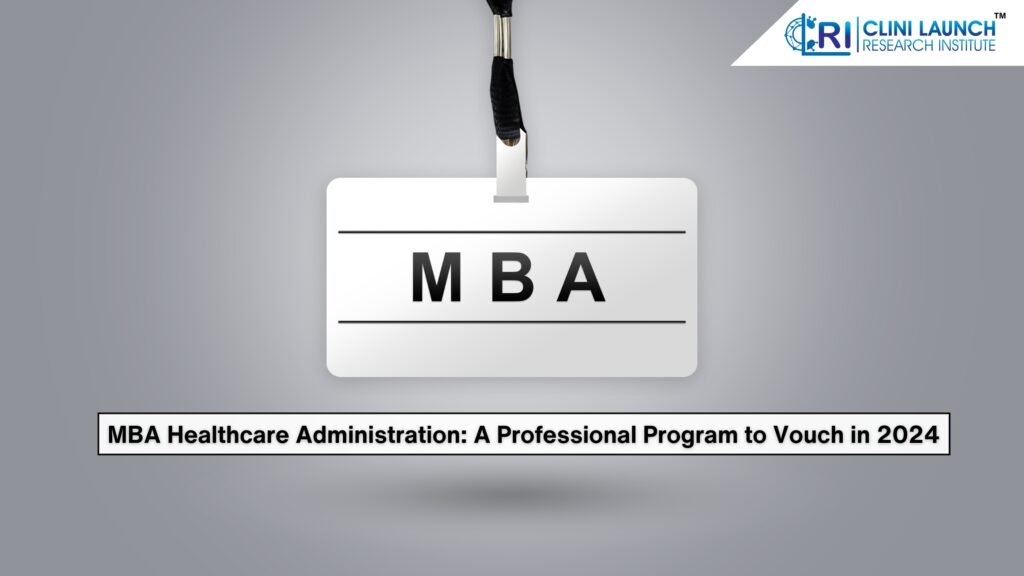Recently, the University of CINCINNATI reported 28% growth in jobs for healthcare managers from 2022 to 2032. The increase in chronic disease to meet the patient care needs with healthcare services are the most important reasons for growth. Beside growing demand for healthcare managers, they could effectively manage complex tasks while driving most decisions related to their department.
Henceforth, pursuing an MBA healthcare administration or management program will help you acquire business acumen. It will also help you with implications and nurturing your leadership skills to excel in the healthcare industry. Given this comprehensive guide, deep dive into the key aspects of an MBA program including curriculum, career opportunities, and admission requirements.
What is an MBA healthcare administration?

Designed by Karthik C (Graphic Designer at CliniLaunch)
MBA healthcare management is a 2-year degree that combines core administration principles with healthcare-specific knowledge. It provides you a deep understanding of the healthcare industry including different aspects such as finance, operations, regulations, and strategic planning. With the completion of MBA in healthcare, graduates develop the skills required to manage hospitals, clinics, and healthcare insurance companies, and other healthcare organizations effectively.
MBA Healthcare Management Course Syllabus at CliniLaunch
MBA Healthcare Management course from CliniLaunch offer 3x impact on your career with a dual specialization and one PG Diploma Program in Clinical Research or AI & ML in healthcare. A dual specialization in an MBA program allows you to focus on two business administration areas within a single course leading to a variety of benefits. Moreover, with one major course as healthcare management, you are going to explore either marketing management, business analytics or logistics & supply chain management along with one postgraduate CliniLaunch course. Check below given course syllabus for MBA (Healthcare Management) in affiliation with Bangalore University.
| Semester 1 | Semester 2 |
| – Economics for Managers – Organizational Behavior – Accounting for Managers – Statistics for Management – Marketing for Customer Value – Business and Industry | – Technology for Management – Managerial Research Methods – Entrepreneurship and Ethics – Human Capital Management – Financial Management – Quantitative Techniques and Operation Research |
| Semester 3 | Semester 4 |
| – Strategic Management & Corporate Governance – Projects and Operation Management – Healthcare Management Specialization (Choose 1 Only) – Marketing Management – Business Analytics – Logistics & Supply Chain Management | – International Business Dynamics – Healthcare Management Specialization (Based on semester 3) – Marketing Management – Business Analytics – Logistics & Supply Chain Management |
MBA Hospital Administration Course Highlights

Designed by Karthik C (Graphic Designer at CliniLaunch)
- Dual Specialization- Healthcare Management & Marketing | Healthcare Management & Business Analytics | Healthcare Management and Logistics & Supply Chain Management.
- Additional Programs- Post Graduate Diploma in Clinical Research | AI & ML in Healthcare.
- Summer Internship Program in Healthcare- Gain practical experience with leading organizations.
- 100% Placement Assistance in collaboration with Healthcare and Pharmaceutical Companies.
- Industry-Experienced Faculty- Learn from Healthcare Experts.
- Blended Education and Upskilling- Combining formal education with professional development.
Selection of Additional Program
In addition to three major courses during semester 3 of MBA in healthcare management program, you shall have to choose a specialization whether in Marketing Management, Logistics & Supply Chain Management, or Business Analytics. From Semester 2, you need to choose between one PG diploma course from CliniLaunch either Clinical Research or AI & ML in Healthcare. Ideally, the PG Diploma Program will be conducted before students proceed for Semester 3. Also, during Semester 4, you shall have to continue your second specialized program you chose during semester 3.
Career Paths Post MBA Hospital Administration
MBA hospital administration degree or management degree opens doors to a wide range of career paths with CliniLaunch offered courses. It may include the roles of healthcare consulting, health information management, hospital administration itself. Expect your salary based on the factors such as your experience, roles & responsibilities, and location. However, post MBA degree, competitive salaries, and excellent career paths can be expected. Following are the combination of roles to leverage your expertise in healthcare management, clinical research or AI & ML in healthcare from CliniLaunch.
Designed by Karthik C (Graphic Designer at CliniLaunch)
Eligibility Criteria
The eligibility criteria for MBA healthcare administration includes undergraduates or graduates with a bachelor’s degree in life sciences, biotechnology, biomedical engineering, MSc. Microbiology, or Chemistry, etc.
Note: Those of you in the final year or semester of your Bachelor’s degree are also eligible for the course.
MBA hospital Administration for Working Professionals
As a working professional, you get immense quality time to study at CliniLaunch full-time MBA with an on-campus program twice a week. It might be a viable option for you as you will be able to learn at your own pace. By enrolling for an MBA in Healthcare management, you can focus on developing your leadership & strategic capabilities, manage complex changes and lead healthcare operations within the organizations. You just need to balance your studies with your career and personal commitments.
Conclusion
An MBA in Healthcare Administration is a valuable degree for individuals who aspire to leadership roles within the healthcare industry. By combining business acumen with healthcare expertise, MBA graduates are well-prepared to address the complex challenges facing healthcare organizations today. Whether you are interested in hospital administration, healthcare consulting, or entrepreneurship, an MBA can provide you with the skills and knowledge you need to succeed.
Why Choose CliniLaunch for MBA?
CliniLaunch’s MBA course is grounded in real-world healthcare and taught by industry-led experts. It pushes you to consider your business perspectives. With 15+ Corporate tie-ups, 500+ industry relations, and 8000+ vacancies shared to students and working professionals, CliniLaunch offers growth opportunities in the field of healthcare. With continuous corporate connect, and world-class qualified faculty, the expert interaction helps you to get corporate ready (if new).
You will get access to e-resources, robust curriculum, and highly-qualified industry professionals. Moreover, the centralized placement team ensures 100% placement assistance for you on a national or global level. To know more, visit: https://clinilaunchresearch.in/mba-in-healthcare-management/






NY weekly This is my first time pay a quick visit at here and i am really happy to read everthing at one place
Brilliantly presented. Each quote was excellent, and thanks for sharing this amazing content. Keep motivating and sharing more.
Beautifully done. Each quote was fantastic, and thank you for sharing the content. Keep up the motivation and inspiration.